An inquisitive, perceptive, and innovative engineering approach by Falcon Engineering helped Royal Roads University avoid unnecessary construction costs, as well as disruptive work, in the design for a geoexchange ground coupling system for the Dogwood Auditorium.
The Project
A “geoexchange system” may sound complex, but it is really as simple as its name implies: exchanging “heat” from earth materials or groundwater below the earth’s surface with the building’s HVAC systems, so as to provide heating and cooling energy, all without consuming fossil fuels or adding to the building’s Carbon Emissions. Our blog, An Introduction To Geoexchange, gives an overview of geoexchange engineering systems.
Falcon’s Energy Engineering team has completed just such a project at the Dogwood Auditorium at Royal Roads University, near Victoria BC.

The Royal Roads Campus is situated at the base of a prominent escarpment slope. Areas on campus along the base of the slope have high water tables and, in some areas of the Royal Roads campus, footing interceptor drains are required to control shallow groundwater to protect buildings and infrastructure. Water intercepted by these drains throughout the year is collected and conveyed by pipeline as stormwater discharge. Several years ago, the campus irrigation system was outfitted to use water from the interceptor drains as the main source of water for grounds irrigation to make beneficial use of the intercepted water.
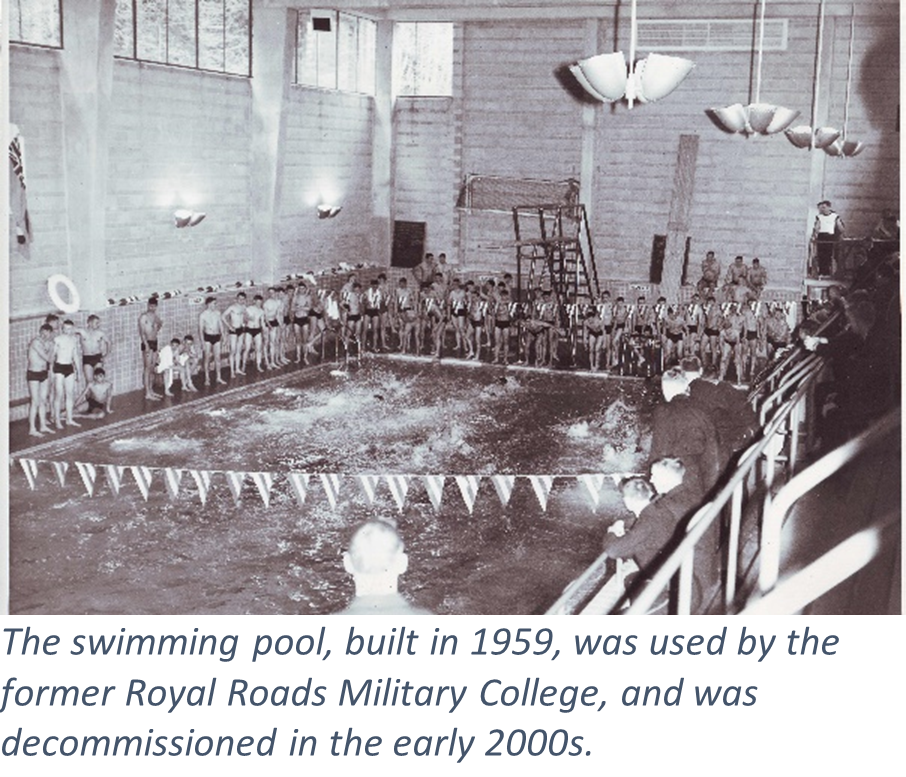
When a project arose to convert the swimming pool (originally built in the late 1950s for the former military college) to a new purpose, the Royal Roads planners wanted to ensure that reducing carbon emissions was an important component of the project plan and budget.
Royal Roads University selected Falcon’s Energy Engineering team, under a competitive RFP process, to examine the natural setting and propose a solution for an alternate energy system to be applied at the legacy building, repurposed as the Dogwood Auditorium.
The project to regenerate the building for learning and events space was opened in its new format in Spring 2021, including the geoexchange heating and cooling system. The system resulted in significantly reduced Greenhouse Gas (GHG) emissions for the Dogwood Auditorium, while providing the energy for comfort conditions throughout the year, with little reliance (peak heating) on fossil fuel energy.
From a Site Visit to Design of the Innovative Geoexchange System
Falcon was selected to design the new geoexchange ground heat exchange (GHX) system (HVAC design was already awarded to another firm), and in the summer and fall of 2019, conducted a thorough site-specific Geoexchange Suitability Assessment (GSA) to investigate the most suitable geoexchange options for the project site. The initial concept envisioned by Royal Roads University (RRU) included an open-loop water well geoexchange system, whereby groundwater would be pumped from one or more extraction wells from which the groundwater would be passed through a heat exchanger, and subsequently re-injected to the ground by one or more injection wells.
However, through the process of conducting the GSA, Falcon became aware of the presence of the significant drain water discharge. Exploratory investigations by Falcon of rushing water in manholes near the prospective Dogwood Auditorium led to the reveal of an existing, readily available energy source, already “plumbed” near the surface.
Falcon conducted further investigations and analysis to establish that the drainage water would be of sufficient flow quantity, and at a satisfactory temperature throughout a given year, before committing to the client that the drainage water would serve as a suitable and reliable ground source coupling for the geoexchange system.
Data from Environment Canada of seasonal climate norms over a period of approximately 30 years was critical to the analysis. Flow rates of the drainage water were measured over the spring and summer of 2019 and added to anecdotal information from the RRU Operators of the irrigation system. Together, these data sets were applied to a calculated “stress test” to ascertain the values of the drain water system as a source of energy to moderate indoor temperatures of the Dogwood Auditorium, as well as to ascertain the likely impacts of the “heat rejection” back into the drain water system during each of the four seasons. The combined analysis demonstrated that this drain water system could be relied upon as an appropriate energy source for heating and cooling the Dogwood Auditorium, and that heat rejection from the Dogwood Auditorium would not deleteriously affect the adjacent ocean water temperatures, to which the drain water from RRU flows.
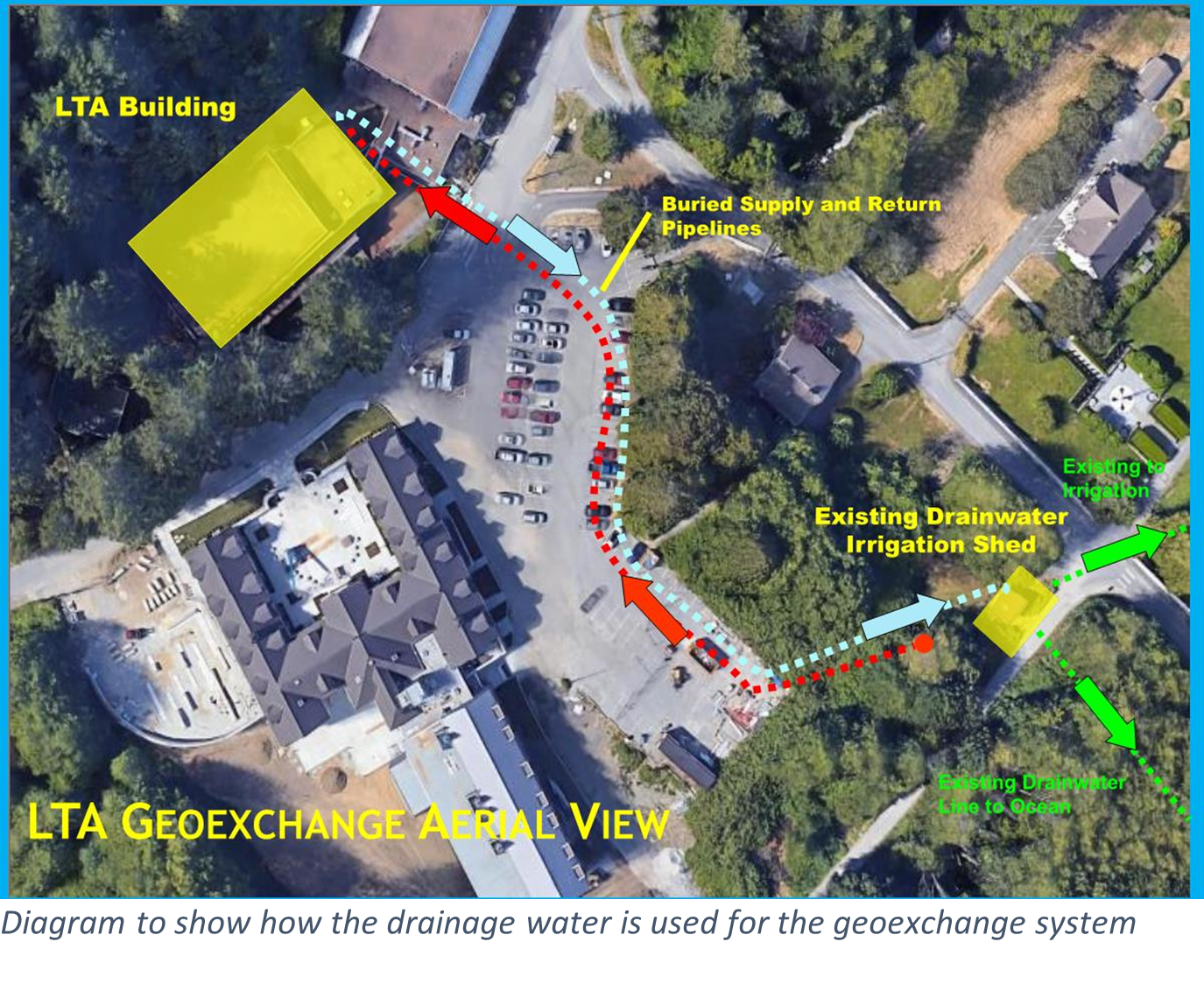
Thus, Falcon was able to demonstrate the values of the proposed ground source coupling to the geoexchange system and was also able to demonstrate that the environmental impacts of using the ground source coupling (the drain water system) would not impose undesirable impacts (such as excessively warm temperatures) on the drain water or the ocean water.
With any type of retrofit or repurposing project, unexpected findings and conditions are prone to be discovered and this project was no exception. Although the intercepted groundwater-derived drain water had been used for many years by the irrigation system without any history of debris or sedimentation problems, new flows were recently added to the drain water system that included contributions from rooftop drainage. In many geographic locations, rooftop drainage would not pose significant problems; however, on the heavily treed RRU campus, rooftop drainage can be laden with organic debris. In this case, organic debris in the form of evergreen needles and other organics, entered the drain water system from the new sources and contributed to maintenance concerns for both the existing irrigation system and the new geoexchange system. A simple screen and diversion modification was implemented by the Project Civil Engineer in Fall 2021 and seems to be working effectively. Ongoing monitoring is warranted and perhaps additional modifications may be required.
An Energy Efficient Building System
The portion of the heating load served by ground source heat pumps for the Geoexchange System, employing energy derived from the flows of the drain water system existing on campus, results in a 98% reduction in emitted CO2e as compared to the “base case” of standard naturally aspirated boiler and standard air handling systems (commonly found in buildings of that age and utility).
Combined with the relatively low costs of drawing energy from the existing groundwater drainage system, when compared to employing a drilled well system and open or closed loop geoexchange system piping, the resultant system provided the client with:
- a lower capital cost
- very low energy consumption characteristics in operation
- very low GHG emissions,
- and comfortable conditions throughout the year.
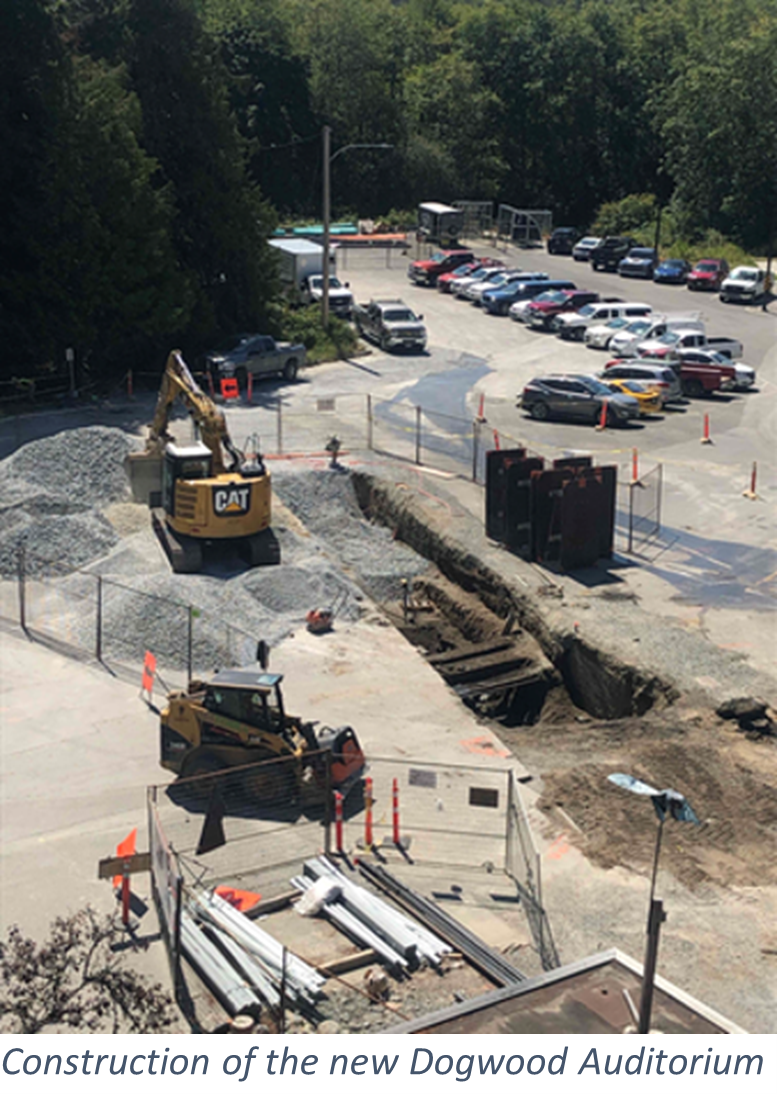
A win for the client, a credit to the design engineers and installation contractors, and a credit to the institution (Royal Roads University) who commissioned the project.
Aligning with the Royal Roads University Climate Action Plan
The project to repurpose the former swimming pool at RRU into what is now known as the Dogwood Auditorium reflects the best in contemporary construction and facilities planning. As the Royal Roads University Climate Action Plan calls for significant GHG reductions by 2035, it was seen by University planners as an important aspect of the new use of this existing building that it would not add to the University’s GHG emissions, while simultaneously providing a much-needed events and learning space for the campus.
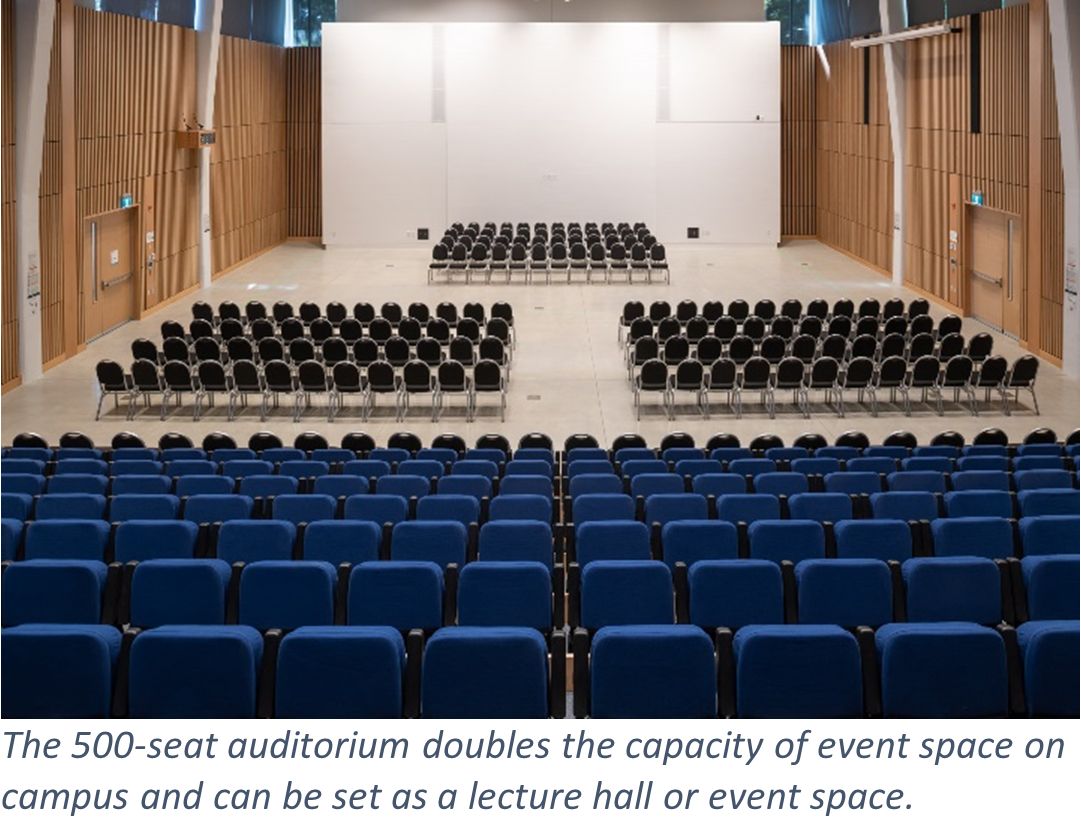
Consequently, as the geoexchange system delivers on the heating and cooling needs of the Dogwood Auditorium, it does not add CO2e liabilities for RRU, and provides modern ventilation and comfort conditions even when fully occupied by Convocation Ceremonies, University staff meetings, student study areas, and community events.
From an Aged Facility to a State-of-the-Art Auditorium
Royal Roads University and Durwest Construction set out with a vision to repurpose an aged facility and transform it into a state-of-the art auditorium. The level of innovation and commitment to sustainable transformation is a remarkable and defining feature of the redevelopment project. Re-purposing of the drain water, that would otherwise have been wasted, into an energy source seemed to mesh well within the vision of this type of transformation.
As a standard of practice at Falcon Engineering, we emphasize the importance for careful consideration of both the setting- and the building-specific features of a project, to thoroughly examine opportunities for development of a low carbon energy system. In the case of the geoexchange ground coupling at RRU Dogwood Auditorium, this standard of practice ensured that the opportunities inherent in the existing drain water system were recognized early in the investigation process, and subsequently led to an affordable and successful geoexchange system to serve the Dogwood Auditorium. Falcon Engineering feels honoured to have played a role on this team.
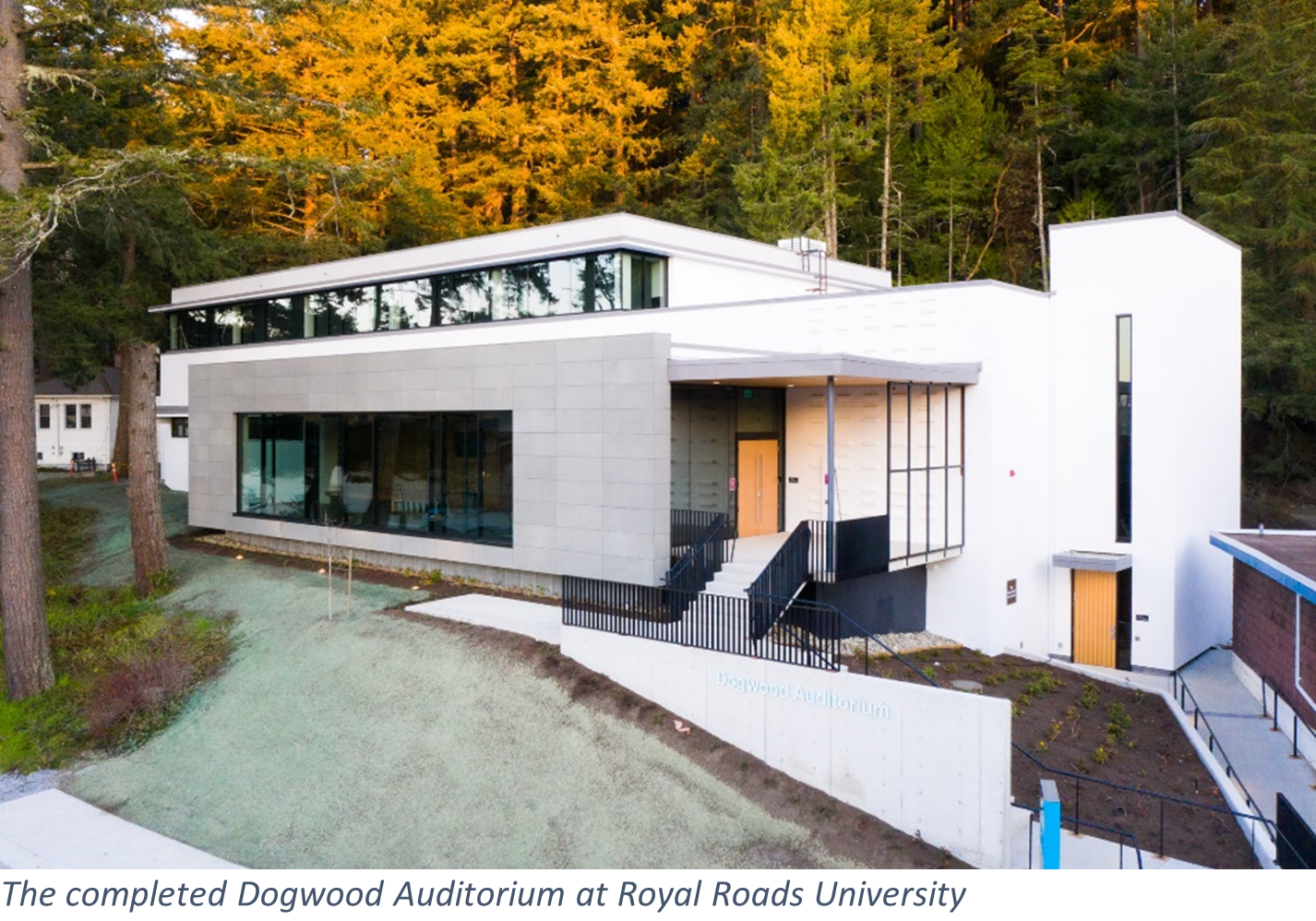
You can find out more about our Energy Engineering services here and more about our team.
If you have questions about our experience or the geoexchange work we do, get in contact by using our contact page.
Want to learn more about energy engineering? Check out some of our other blogs!